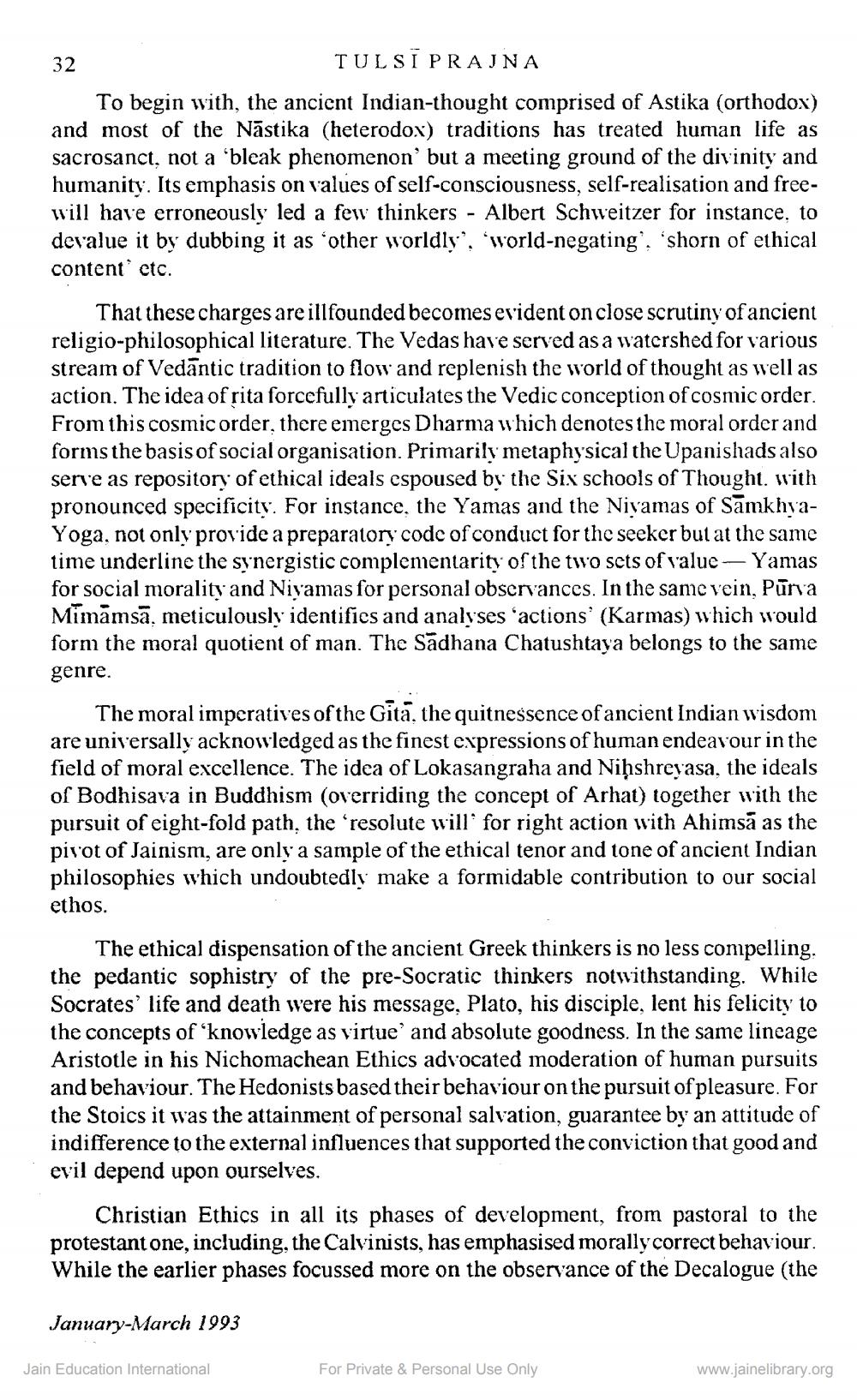________________
32
TULSI PRAJNA
To begin with, the ancient Indian-thought comprised of Astika (orthodox) and most of the Nāstika (heterodox) traditions has treated human life as sacrosanct, not a 'bleak phenomenon' but a meeting ground of the divinity and humanity. Its emphasis on values of self-consciousness, self-realisation and freewill have erroneously led a few thinkers - Albert Schweitzer for instance, to devalue it by dubbing it as 'other worldly?, 'world-negating shorn of ethical content' etc.
That these charges are illfounded becomes evident on close scrutiny of ancient religio-philosophical literature. The Vedas have served as a watershed for various stream of Vedāntic tradition to flow and replenish the world of thought as well as action. The idea of rita forcefully articulates the Vedic conception of cosmic order. From this cosmicorder, there emerges Dharma which denotes the moral order and forms the basis of social organisation. Primarily metaphysical the Upanishads also serve as repository of ethical ideals espoused by the Six schools of Thought. with pronounced specificity. For instance, the Yamas and the Niyamas of SamkhyaYoga, not only provide a preparatory code of conduct for the seeker but at the same time underline the synergistic complementarity of the two sets of value — Yamas for social morality and Niyamas for personal observances. In the same vein, Pūrva Mimāmsā, meticulously identifics and analyses 'actions' (Karmas) which would form the moral quotient of man. The Sadhana Chatushtaya belongs to the same genre.
The moral imperatives of the Gita. the quitnessence of ancient Indian wisdom are universally acknowledged as the finest expressions of human endeavour in the field of moral excellence. The idea of Lokasangraha and Niḥshreyasa, the ideals of Bodhisava in Buddhism (overriding the concept of Arhat) together with the pursuit of eight-fold path, the ‘resolute will for right action with Ahimsa as the pivot of Jainism, are only a sample of the ethical tenor and tone of ancient Indian philosophies which undoubtedly make a formidable contribution to our social ethos.
The ethical dispensation of the ancient Greek thinkers is no less compelling. the pedantic sophistry of the pre-Socratic thinkers notwithstanding. While Socrates' life and death were his message, Plato, his disciple, lent his felicity to the concepts of knowledge as virtue' and absolute goodness. In the same lineage Aristotle in his Nichomachean Ethics advocated moderation of human pursuits and behaviour. The Hedonists based their behaviour on the pursuit of pleasure. For the Stoics it was the attainment of personal salvation, guarantee by an attitude of indifference to the external influences that supported the conviction that good and evil depend upon ourselves.
Christian Ethics in all its phases of development, from pastoral to the protestant one, including, the Calvinists, has emphasised morally correct behaviour. While the earlier phases focussed more on the observance of the Decalogue (the
January-March 1993
Jain Education International
For Private & Personal Use Only
www.jainelibrary.org




